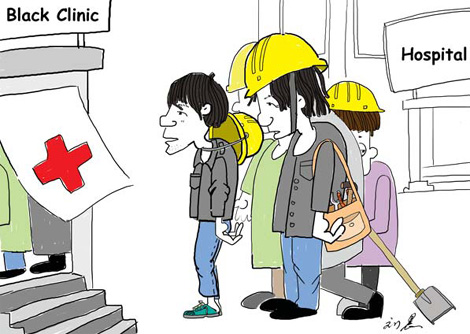Comment
Black clinics help migrants
By Wang Ru (China Daily)
Updated: 2009-12-07 09:57

A recent media investigation into "black", or illegal clinics in Beijing recently changed my perspective on the medical services provided by their unqualified doctors.
Generally the media view of black clinics is that they provide nothing of use to the healthcare system, and only create illegal, unhygienic and medical accidents.
However, I also noticed that black clinics, which mainly provide medical services to migrant workers, are popular because of their lower fees. "The doctors are nice to me here," a young male migrant worker told the media. "I don't want to go to downtown hospitals because I get no respect there." In addition, black clinics offer flexible services to workers by selling medicine in response to their specific requirements, and can even work on a credit system.
According to statistics released this November by the Beijing hygienic inspection bureau, there are about 1,200 black clinics in Beijing. Every year the bureau is assisted by the police to shut many down, but they always return.
It's with this in mind that I hope the government will treat black clinics as a reminder of the importance of ongoing medical reforms.
Medical services should be an equal right, not just a privilege for citizens. Though it is a huge financial burden, a responsible government should cover the medical insurance for all people, including vulnerable groups like migrant workers.
However, a report from World Health Organization (WHO), widely quoted by the Chinese media, showed that financial investments in China's healthcare system ranked only 188th in the WHO's 192 member countries.
It's because medical services are such a scarce resource in this country that migrant workers, not included in the current medical insurance system, are forced to step into black clinics.
Many black clinics are managed by unlicensed, but not unqualified, doctors. Some are graduates from medical schools who were unable to get jobs in hospitals or a license to open their own private clinics.
Private medical providers can also help medical reforms by establishing a more open and regulated market.
Why not allow more qualified private clinics and hospitals to enter into the current medical system?
In my opinion, the government should provide assistance to qualified private clinics such as loans and medical training.
Those private clinics, under proper regulation of the government, could generate flexible alternatives to social groups that would otherwise struggle in mainstream hospitals.
And the negative image of our public hospitals and doctors should also be changed. Doctors should lower their superior attitudes to patients in order to build trust.
Sounds difficult? Facing the current problems of our medical reforms, it might be worth a try.













